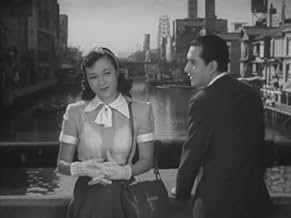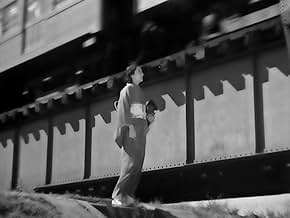Meshi
- 1951
- 1h 37min
CALIFICACIÓN DE IMDb
7.6/10
1.9 k
TU CALIFICACIÓN
Agrega una trama en tu idiomaMichiyo lives in a small home in Osaka and is not happy with her marriage; all she does is cook and clean for her husband.Michiyo lives in a small home in Osaka and is not happy with her marriage; all she does is cook and clean for her husband.Michiyo lives in a small home in Osaka and is not happy with her marriage; all she does is cook and clean for her husband.
- Dirección
- Guionistas
- Elenco
- Premios
- 9 premios ganados en total
Opiniones destacadas
Repast is the first of many films by Mikio Naruse to be based on the stories of Fumiko Hayashi, in this case on Hayashi's last unfinished novel. Repast is a family drama set in Osaka and Tokyo shortly after the end of World War II. Economic circumstances make life difficult for Michiyo, an Osaka housewife played by Ozu regular Setsuko Hara in an exceptionally nuanced performance. She has been married for five years and the dream of a better life has faded. Her husband Hatsunosuke (Ken Uehara) has a low paying job and her life consists only of the repetitive chores of cleaning, washing, and cooking with no promise of a better future, a fact that she draws constant attention to.
Michiyo is at first welcoming when Hatsunosuke's niece Satoko (Yukiko Shimazaki) comes to visit but soon becomes annoyed and jealous when her husband takes her on a tour of Osaka and pays an inordinate amount of attention to her charms. When her dissatisfaction becomes crystallized, she decides to return to Tokyo to visit her mother (Haruko Sugimura). She is torn between wanting to find a job and remaining separated or returning to her husband to continue with the struggle. She writes a letter to Hatsunosuke ostensibly to say she will not return but it is never mailed. The way her ambivalence is resolved will cause some consternation for modern day women's rights advocates, but seems appropriate under the circumstances and I left the theater feeling elated.
Michiyo is at first welcoming when Hatsunosuke's niece Satoko (Yukiko Shimazaki) comes to visit but soon becomes annoyed and jealous when her husband takes her on a tour of Osaka and pays an inordinate amount of attention to her charms. When her dissatisfaction becomes crystallized, she decides to return to Tokyo to visit her mother (Haruko Sugimura). She is torn between wanting to find a job and remaining separated or returning to her husband to continue with the struggle. She writes a letter to Hatsunosuke ostensibly to say she will not return but it is never mailed. The way her ambivalence is resolved will cause some consternation for modern day women's rights advocates, but seems appropriate under the circumstances and I left the theater feeling elated.
Hara gives a stellar performance. However, if you're new to her or if you're new to Japanese films, period, then this is not the place to start. Unfortunately, I find this film boring. I would've given it a 4, but Hara's performance bumps it up at least three stars to a 7.
There is no plot, just the point that Hara's character feels trapped in a boring marriage as she leads a mundane existence. There's no real action, no intense conflict--at least none that isn't internal. This is purely a character study and psychological look into a failing marriage.
I will say that the movie, in my opinion, does an excellent job at reminding us that marriage is meant to be forever but that doesn't mean it will always be a source of joy. It's just like life, in general--it's a mix of pleasant and unpleasant and, yes, even mundane experiences. And I tip my hat to the director for expressing that so keenly.
But the truth is, I wanted to stop watching halfway through because I was bored. I kept watching, though, because of Hara. What an amazing actress she was.
There is no plot, just the point that Hara's character feels trapped in a boring marriage as she leads a mundane existence. There's no real action, no intense conflict--at least none that isn't internal. This is purely a character study and psychological look into a failing marriage.
I will say that the movie, in my opinion, does an excellent job at reminding us that marriage is meant to be forever but that doesn't mean it will always be a source of joy. It's just like life, in general--it's a mix of pleasant and unpleasant and, yes, even mundane experiences. And I tip my hat to the director for expressing that so keenly.
But the truth is, I wanted to stop watching halfway through because I was bored. I kept watching, though, because of Hara. What an amazing actress she was.
Gentle and touching portrait of a marriage. Setsuko Hara and Ken Uehara play a young married couple who have been living in Osaka for a while now, after having met and married in Tokyo. Life in Osaka is pretty dull, especially for Hara, who does little but housewife day in and day out. Uehara doesn't make much money, and his job prospects are weak. They're in a rut. When Uehara's beautiful young niece comes for an unannounced visit, Hara's dissatisfaction with life becomes too much to bear. As is usual for Naruse, the characters are extremely well developed and their emotional dilemmas are very easy to sympathize with. The acting is excellent throughout, with Hara giving one of her very best performances.
A sensitive look at an unhappy housewife, with fine performances by Setsuko Hara as the wife and Ken Uehara as the everyman schlub she's married to, and incisive dialogue and characterization by, among others, Nobel Prize winning novelist Yasunari Kawabata, this film ultimately succumbs to overly deliberate pacing, too many sub plots that go nowhere and add nada, a sexist ending that is an ode to wifely submission and a general sense, for me at least, that I'd rather be watching Ozu. Give it a B minus. PS...Coulda used more of the cat and less of Satoko.
Being a housewife in a working-class mews in Osaka has grown wearying for Setsuko Hara. Life with Ken Uehara is a dull routine of breakfast with him reading the newspaper, her scrubbing the house, and him coming home late to announce he's hungry. It all boils over when his flibbertigibbet niece, Yukiko Shimazaki, shows up. She has run away from home, rather than marry the rich man her parents have chosen. Uehara buys tickets to take them all on a Sunday outing. Setsuko stays home to scrub the tatami mats. She wants to run away to Tokyo and her mother. She decides not to. She's going to leave that night. Maybe she'll leave in the morning.
Mikio Naruse was one of the two principle directors of Shomin-Gekim dramas of the the working poor in Japan; the other was the revered Ozu, for whom Miss Hara often worked -- when Ozu died, she retired. Naruse's film looks far more like a conventional film than Ozu's -- moving shots, camera placement above the floor, and so forth -- but with this movie he tackles a story; Ozu may show the audience the working parts of his families -- because of their interchangeable casts, sometimes they all seem like the same family -- and how they work. His movies are group portraits. Naruse tackles the question of why they should work, why they should put up with the drudgery, and makes that voyage of self-discovery his film's story.
Bob
Mikio Naruse was one of the two principle directors of Shomin-Gekim dramas of the the working poor in Japan; the other was the revered Ozu, for whom Miss Hara often worked -- when Ozu died, she retired. Naruse's film looks far more like a conventional film than Ozu's -- moving shots, camera placement above the floor, and so forth -- but with this movie he tackles a story; Ozu may show the audience the working parts of his families -- because of their interchangeable casts, sometimes they all seem like the same family -- and how they work. His movies are group portraits. Naruse tackles the question of why they should work, why they should put up with the drudgery, and makes that voyage of self-discovery his film's story.
Bob
¿Sabías que…?
- TriviaThis film revived the shomingeki sub-genre in which lower middle class and struggling families are depicted.
- Citas
Michiyo Okamoto: [voiceover] My husband is sitting at the table. I bring a pot of miso soup from the kitchen. Yesterday, today, and tomorrow, for 365 days a year, morning and night, come and go unvaryingly. With a life restricted to the kitchen and the family room, must every woman grow old and die feeling empty?
- ConexionesReferenced in Century of Cinema: Nihon eiga no hyaku nen (1995)
Selecciones populares
Inicia sesión para calificar y agrega a la lista de videos para obtener recomendaciones personalizadas
Detalles
- Tiempo de ejecución1 hora 37 minutos
- Color
- Mezcla de sonido
- Relación de aspecto
- 1.37 : 1
Contribuir a esta página
Sugiere una edición o agrega el contenido que falta

Principales brechas de datos
By what name was Meshi (1951) officially released in India in English?
Responda




























